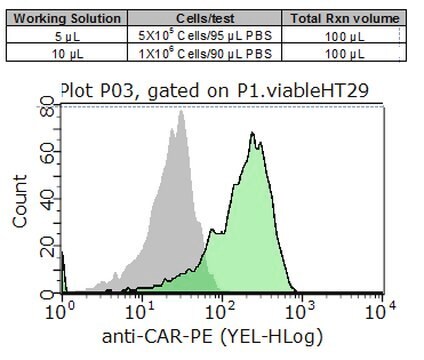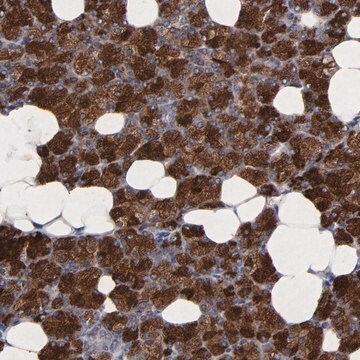05-644
Anti-CAR Antibody, clone RmcB
clone RmcB, Upstate®, from mouse
別名:
46 kD coxsackievirus and adenovirus receptor (CAR) protein, CVB3 binding protein, CVB3-binding protein, Coxsackievirus B-adenovirus receptor, coxsackie virus B receptor, coxsackie virus and adenovirus receptor
About This Item
おすすめの製品
由来生物
mouse
品質水準
抗体製品の状態
purified immunoglobulin
抗体製品タイプ
primary antibodies
クローン
RmcB, monoclonal
化学種の反応性
human, rat, mouse
メーカー/製品名
Upstate®
テクニック
immunocytochemistry: suitable
western blot: suitable
アイソタイプ
IgG1
NCBIアクセッション番号
UniProtアクセッション番号
輸送温度
wet ice
ターゲットの翻訳後修飾
unmodified
遺伝子情報
human ... CXADR(1525)
詳細
特異性
免疫原
アプリケーション
1-2 μg/mLで使用、HeLa細胞およびhCARトランスフェクトしたCHO細胞においてCARに対する陽性染色が確認されますが、4% paraformaldehydeで固定し、0.2% Triton-Xで透過処理したトランスフェクトしていないCHO細胞では見られません。
品質
ウェスタンブロッティング:
希釈倍率1:500で使用、10 µgのマウス小腸ライセートにおいてCarを検出できます。
ターゲットの説明
物理的形状
その他情報
法的情報
Not finding the right product?
Try our 製品選択ツール.
保管分類コード
10 - Combustible liquids
WGK
WGK 1
適用法令
試験研究用途を考慮した関連法令を主に挙げております。化学物質以外については、一部の情報のみ提供しています。 製品を安全かつ合法的に使用することは、使用者の義務です。最新情報により修正される場合があります。WEBの反映には時間を要することがあるため、適宜SDSをご参照ください。
Jan Code
05-644:
試験成績書(COA)
製品のロット番号・バッチ番号を入力して、試験成績書(COA) を検索できます。ロット番号・バッチ番号は、製品ラベルに「Lot」または「Batch」に続いて記載されています。
ライフサイエンス、有機合成、材料科学、クロマトグラフィー、分析など、あらゆる分野の研究に経験のあるメンバーがおります。.
製品に関するお問い合わせはこちら(テクニカルサービス)








